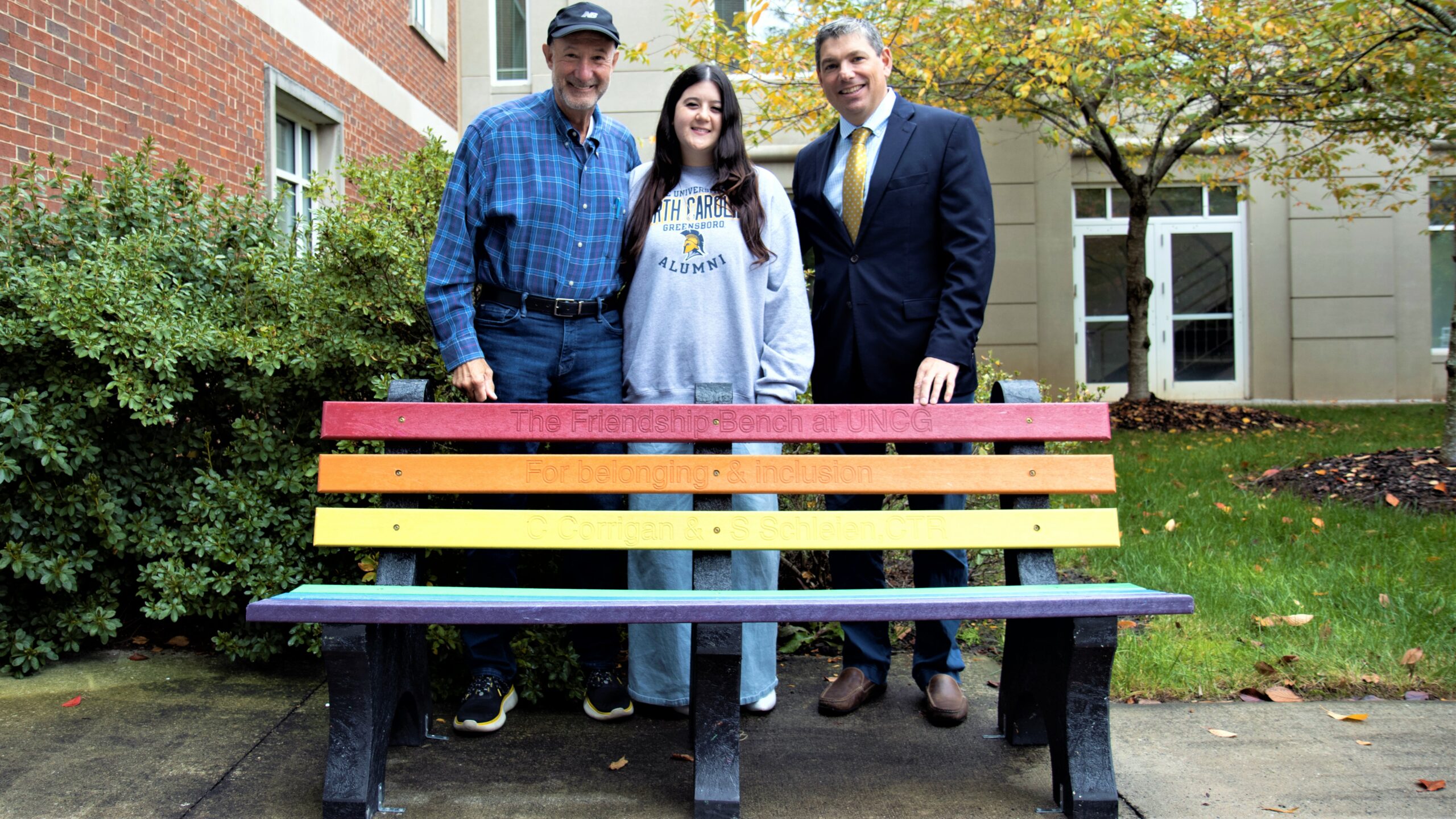A new, brightly-colored bench that now sits outside the Elliot University Center is the culmination of a four-year project for Community and Therapeutic Recreation alumna Claire Corrigan. She thought of the project in 2018, the summer before she started her master’s degree.
“I saw a video on Facebook… about how this group of people did a social experiment. They placed yellow-colored benches in a park and had older adults sit there to try and get people walking by to start conversations with them,” she said.
Corrigan wanted to do something similar on UNCG’s campus, bringing people together in an inclusive environment with a Friendship Bench. The world can be isolating, especially if you have disabilities or mental illnesses, she said, and she wanted to foster a community, in part, so these people are included.
Learning About Friendship Benches
Corrigan found a link from a special education school that also does Friendship Benches, but makes them in a unique way: With students collecting plastic bottle caps that are the materials for the benches. Inspired by this idea, she started collecting bottle caps from UNCG’s campus to aid with recycling efforts and promote sustainability, alongside community and inclusiveness.
Corrigan put a significant amount of thought into how people interact with people with disabilities in her time with the Beyond Academics program.
I thought it would just make people more open to diversity and inclusion.
Claire Corrigan
She talked about this project with her advisor, Dr. Stuart Schleien, Professor Emeritus in the Department of Community and Therapeutic Recreation, after completing her bachelor’s degree and preparing to start her graduate degree. Both were interested in recreation therapy, and they shared a passion for building friendships among people of all abilities.
“I thought the bench was fitting with (Community, Therapeutic and Recreation’s) mission, our School and our Department. The bench celebrates diversity, and that’s what this Department, School and University are all about. It provides an opportunity for people with and without disabilities to get to know each other,” Schleien said. “I thought the Friendship Bench fit with social inclusion, and it was a double win, because it keeps all of this plastic out of the landfill.”
More Than a Bench
As a master’s student in Therapeutic Recreation, Corrigan asked students in classes she taught to collect bottle caps for the bench construction. She and Schleien also placed cups around a common building on campus with signs asking for donations, and even picked up bottle caps around campus with friends. Corrigan had research assistant and teaching assistant roles across campus, in addition to her work.
Schleien suggested she investigate the benefits of recycling plastic bottle caps, as well. It took about two years to collect the perfect weight needed to build the bench, but she kept accepting donations until this year. Roughly 250 pounds of bottle caps were collected, and were stored in closets in the CTR building, the trunk of Corrigan’s car, and in her house.
A shy person herself, Corrigan remembers how difficult her freshman year was and how nervous she felt. She hopes it will spark conversation among people who may struggle to feel included.
“I’ve had so many relatives and people in my life who have disabilities, both mental illnesses and intellectual disabilities, and I always wish people knew that person and how amazing they are, instead of looking at them for their disability or things they’re not,” Corrigan said.
The world would be more kind and more inclusive, especially post-COVID, we need to be kind to each other, and be graceful, and be open to something that might be scary, like talking to someone new.
Claire Corrigan
Green Tree Plastics, the organization that melts bottle caps and turns them into benches, had a few restrictions for the collected bottle caps: They must be clean and undamaged. Corrigan had not realized people would donate caps that were damaged or had things on them. Before turning them in and retrieving her bench, she and a friend cleaned each cap and tossed out the damaged ones. Corrigan ended up donating 217 pounds of collected caps.
Corrigan and Schleien selected a rainbow pattern for the bench design as it’s ideal for inclusion, is symbolic of peace and LGBTQ pride. It also makes the bench stand out from the others on campus.
You can see it from Minerva it stands out so much.
Claire Corrigan
She says that picking up the bench and having it on campus is a surreal experience after working so hard for four years. Having struggled with mental health herself, she’s exceedingly proud of her work. As of today, she is almost finished with her Recreational Therapy license.
This project ties well with her path because she will employ many different methods to foster friendship, especially since she has a passion for working with people who have intellectual or developmental disabilities.
The friendship bench was enhanced with the efforts of Facilities Design and Construction Manager David Friedman and his staff, who embossed, “The Friendship Bench at UNCG for belonging and inclusion,” on the bench, as well as Corrigan’s and Schleien’s names.
Corrigan and Schleien also credit the many staff members at UNCG who worked together to find a prominent location at UNCG, and then installed the bench. They’re also grateful to HHS and the CTR faculty and staff for being supportive of the project.
“Claire did all of the work, but it was so consistent with my values and the department’s work and the diversity and inclusion we support,” Schleien said. “It is consistent with the mission of the department, and to see it on campus is a terrific thing.”
Written by Olivia Stimpson, with contributions by Sarah Newell.
